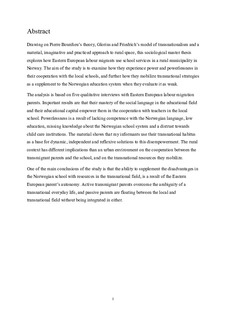Austeuropeiske foreldre sine transnasjonale skulestrategiar
Master thesis
Permanent lenke
http://hdl.handle.net/11250/2566351Utgivelsesdato
2017Metadata
Vis full innførselSamlinger
Sammendrag
Drawing on Pierre Bourdieu’s theory, Glorius and Friedrich’s model of transnationalism and a material, imaginative and practiced approach to rural space, this sociological master thesis explores how Eastern European labour migrants use school services in a rural municipality in Norway. The aim of the study is to examine how they experience power and powerlessness in their cooperation with the local schools, and further how they mobilize transnational strategies as a supplement to the Norwegian education system when they evaluate it as weak.
The analysis is based on five qualitative interviews with Eastern European labour migration parents. Important results are that their mastery of the social language in the educational field and their educational capital empower them in the cooperation with teachers in the local school. Powerlessness is a result of lacking competence with the Norwegian language, low education, missing knowledge about the Norwegian school system and a distrust towards child care institutions. The material shows that my informants use their transnational habitus as a base for dynamic, independent and reflexive solutions to this disempowerment. The rural context has different implications than an urban environment on the cooperation between the transmigrant parents and the school, and on the transnational resources they mobilize.
One of the main conclusions of the study is that the ability to supplement the disadvantages in the Norwegian school with resources in the transnational field, is a result of the Eastern European parent’s autonomy. Active transmigrant parents overcome the ambiguity of a transnational everyday life, and passive parents are floating between the local and transnational field without being integrated in either.
